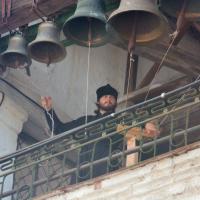Lovers loom largest in Tchaikovsky’s three ‘fantasy overtures’, or ‘symphonic fantasias’, on Shakespearean subjects. Wonderful though the melodies he found for them certainly are, the relationships between the Prince of Denmark and Ophelia in Hamlet (1888), or Ferdinand and Miranda in The Tempest (1873) are hardly as central to the drama as they are in Tchaikovsky’s interpretation. Unquestionably, though, the star-crossed lovers of his first total orchestral masterpiece, Romeo and Juliet, deserve to be celebrated with one of the most famous bitter-sweet themes in all music.
The outlines of what the 29-year-old Tchaikovsky began to compose in late 1869 had all been suggested by a crucial mentor, Mily Balakirev, slow-moving composer and doyen of the nationalist group encountered above and known as the ‘Mighty Little Handful’ (moguchaya kuchka) or ‘The Five’. Tchaikovsky was briefly embraced by this short-lived brotherhood, and moved them to raptures in early nationalist works like the Second Symphony. Romeo and Juliet was more in the line of Berlioz, a programmatic master they all worshipped, however, Tchaikovsky’s own ideas about Shakespeare’s tragedy were very distinct from Berlioz’s ‘dramatic symphony’ on the subject.
The first of those ideas was not the opening of the work as we know it today. Friar Laurence, the young people’s confidant and catalyst of the ultimate tragedy, was initially introduced by a rather placid theme in a major key, part of it sounding like the verse melody of ‘Ol’ Man River’. Balakirev criticised it and recommended instead ‘something like Liszt’s chorales…with an ancient Catholic character resembling that of Orthodox church music’. The solemn opening woodwind chorale punctuated by lower string brooding is the result. Then come the brilliant, syncopated fight music of Montagues and Capulets – and the famous love theme. Balakirev, who had suggested the unusual key, praised the great melody unreservedly:
The second D flat tune is simply delightful. I play it often, and I want very much to kiss you for it. Here are tenderness and the sweetness of love.
The note of poignant regret in the theme, first heard on plaintive cor anglais and muted violas, surely comes from the element of autobiography, Tchaikovsky’s sense of never knowing true happiness in love, as he later told his patroness Nadezhda von Meck.
The subsequent development we hear is very different from Tchaikovsky’s original, 1870 conception. In the revision, he moves the interplay of two of the three themes – at one point balancing eerie chords on a single sustained note, a touch gleaned from Glinka’s Ruslan and Lyudmila Overture – towards a powerful climax in which the two trumpets peal out the Friar Laurence theme in fateful ferocity. The return of the love theme, propelled to its most lush climax, is interrupted by more fighting and a dramatic tumble, after which a funeral march and a tragic coda form the natural conclusion: ‘for never was a story of more woe/ than this of Juliet and her Romeo’.
Composer: Tchaikovsky Wiki Link: https://en.wikipedia.org/wiki/Romeo_and_Juliet_(Tchaikovsky) Title of Musical Work: Fantasy Overture - Romeo and Juliet